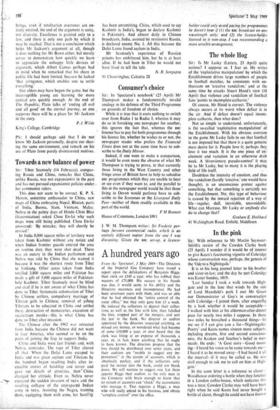Sir: I have read the effusions of Mr Bown (Letters,
4 and 18 April) and of Mr Jackson (Letters, 11 and 25 April) with great interest, and in the substance of the debate, whether standards of morality are to be chosen by the individual or imposed by the recognition of some general norm, maintained in the interests of the majority as a kind of social concrete, there is much to be said for the theory which Mr Jackson obscures by his clever use of the red rag of academic freedom; that is, that the prime social virtue is liberation of the dissident; that a healthy society can exist only if it is capable of hold- ing such people within its orbit, without resorting to coercing them to accept conven- tion.
But while Mr Jackson wears his contro- versialist's hat with great aplomb, a fleeting appearance of his academic gown does not make a happy ensemble. I know not whether he be a classic, but he ought at any rate not to employ the trick of the throw-away allusion considered as proof.
Plato in Book 6 of The Republic main- tains that the standards of the multitude are of little worth. But one swallow does not make a summer, and the rest of his argument does not help Mr Jackson, who must, if he has read the work, be perfectly aware of the fact, for tolerance is the logical end of his reason- ing, whereas Plato proceeds to the idea that 'Truth' is revealed only to the pure philosopher, who therefore ought to rule society. Mr Jack- son would, one supposes, agree that when Plato speaks of the probability of all the citizens obeying a philosopher-king, from recognition of the benefits of the perfect society which he brings, even if totalitarian overtones are en- tirely omitted, the end of the argument is unity, not diversity. Excellence is granted only to a few, and there is only one path by which it may be reached. That is not a conclusion which helps Mr Jackson's argument -at all, though it does nothing for Mr Bown either, btil merely serves to demonstrate how quickly we learn to appreciate the unhappy little devices of argument, which Albert Camus perhaps had in mind when he remarked that his share in public life had been limited, because he lacked 'that arrogance, which enables one to settle everything.'
Our elders may have begun the game, but the incorruptible young are learning the more cynical arts quickly enough. At the end of The Republic, Plato talks of 'ending all evil and all good' on the eternal journey, so one supposes there will be a place for Mr Jackson in the story.
King's College, Cambridge
P. 1. Wilde
PS : I should perhaps add that I do not know Mr Jackson personally, despite our shar- ing the same- environment, and remark on his use of Plato from purely disinterested motives.



































 Previous page
Previous page